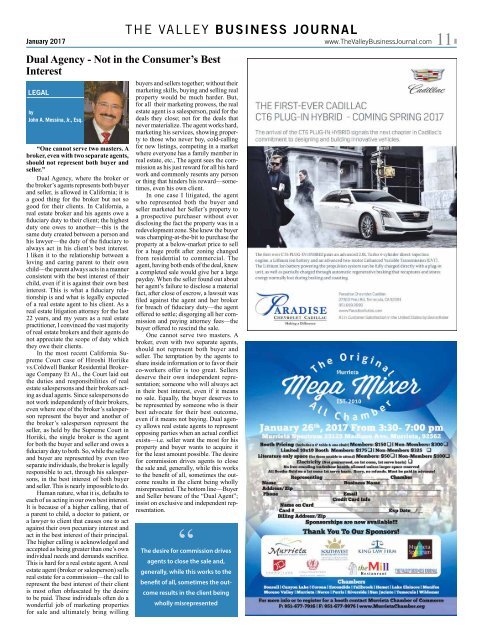January 2017
You also want an ePaper? Increase the reach of your titles
YUMPU automatically turns print PDFs into web optimized ePapers that Google loves.
<strong>January</strong> <strong>2017</strong><br />
Dual Agency - Not in the Consumer’s Best<br />
Interest<br />
LEGAL<br />
by<br />
by John A. Messina, Jr., Esq.<br />
Steve Fillingim<br />
“One cannot serve two masters. A<br />
broker, even with two separate agents,<br />
should not represent both buyer and<br />
seller.”<br />
Dual Agency, where the broker or<br />
the broker’s agents represents both buyer<br />
and seller, is allowed in California; it is<br />
a good thing for the broker but not so<br />
good for their clients. In California, a<br />
real estate broker and his agents owe a<br />
fiduciary duty to their client; the highest<br />
duty one owes to another—this is the<br />
same duty created between a person and<br />
his lawyer—the duty of the fiduciary to<br />
always act in his client’s best interest.<br />
I liken it to the relationship between a<br />
loving and caring parent to their own<br />
child—the parent always acts in a manner<br />
consistent with the best interest of their<br />
child, even if it is against their own best<br />
interest. This is what a fiduciary relationship<br />
is and what is legally expected<br />
of a real estate agent to his client. As a<br />
real estate litigation attorney for the last<br />
22 years, and my years as a real estate<br />
practitioner, I convinced the vast majority<br />
of real estate brokers and their agents do<br />
not appreciate the scope of duty which<br />
they owe their clients.<br />
In the most recent California Supreme<br />
Court case of Hiroshi Horiike<br />
vs.Coldwell Banker Residential Brokerage<br />
Company Et Al., the Court laid out<br />
the duties and responsibilities of real<br />
estate salespersons and their brokers acting<br />
as dual agents. Since salespersons do<br />
not work independently of their brokers,<br />
even where one of the broker’s salesperson<br />
represent the buyer and another of<br />
the broker’s salesperson represent the<br />
seller, as held by the Supreme Court in<br />
Horiiki, the single broker is the agent<br />
for both the buyer and seller and owes a<br />
fiduciary duty to both. So, while the seller<br />
and buyer are represented by even two<br />
separate individuals, the broker is legally<br />
responsible to act, through his salespersons,<br />
in the best interest of both buyer<br />
and seller. This is nearly impossible to do.<br />
Human nature, what it is, defaults to<br />
each of us acting in our own best interest.<br />
It is because of a higher calling, that of<br />
a parent to child, a doctor to patient, or<br />
a lawyer to client that causes one to act<br />
against their own pecuniary interest and<br />
act in the best interest of their principal.<br />
The higher calling is acknowledged and<br />
accepted as being greater than one’s own<br />
individual needs and demands sacrifice.<br />
This is hard for a real estate agent. A real<br />
estate agent (broker or salesperson) sells<br />
real estate for a commission—the call to<br />
represent the best interest of their client<br />
is most often obfuscated by the desire<br />
to be paid. These individuals often do a<br />
wonderful job of marketing properties<br />
for sale and ultimately bring willing<br />
THE VALLEY BUSINESS JOURNAL<br />
www.TheValleyBusinessJournal.com<br />
buyers and sellers together; without their<br />
marketing skills, buying and selling real<br />
property would be much harder. But,<br />
for all their marketing prowess, the real<br />
estate agent is a salesperson, paid for the<br />
deals they close; not for the deals that<br />
never materialize. The agent works hard,<br />
marketing his services, showing property<br />
to those who never buy, cold-calling<br />
for new listings, competing in a market<br />
where everyone has a family member in<br />
real estate, etc., The agent sees the commission<br />
as his just reward for all his hard<br />
work and commonly resents any person<br />
or thing that hinders his reward—sometimes,<br />
even his own client.<br />
In one case I litigated, the agent<br />
who represented both the buyer and<br />
seller marketed her Seller’s property to<br />
a prospective purchaser without ever<br />
disclosing the fact the property was in a<br />
redevelopment zone. She knew the buyer<br />
was champing-at-the-bit to purchase the<br />
property at a below-market price to sell<br />
for a huge profit after zoning changed<br />
from residential to commercial. The<br />
agent, having both ends of the deal, knew<br />
a completed sale would give her a large<br />
payday. When the seller found out about<br />
her agent’s failure to disclose a material<br />
fact, after close of escrow, a lawsuit was<br />
filed against the agent and her broker<br />
for breach of fiduciary duty—the agent<br />
offered to settle; disgorging all her commission<br />
and paying attorney fees—the<br />
buyer offered to rescind the sale.<br />
One cannot serve two masters. A<br />
broker, even with two separate agents,<br />
should not represent both buyer and<br />
seller. The temptation by the agents to<br />
share inside information or to favor their<br />
co-workers offer is too great. Sellers<br />
deserve their own independent representation;<br />
someone who will always act<br />
in their best interest, even if it means<br />
no sale. Equally, the buyer deserves to<br />
be represented by someone who is their<br />
best advocate for their best outcome,<br />
even if it means not buying. Dual agency<br />
allows real estate agents to represent<br />
opposing parties when an actual conflict<br />
exists—i.e. seller want the most for his<br />
property and buyer wants to acquire it<br />
for the least amount possible. The desire<br />
for commission drives agents to close<br />
the sale and, generally, while this works<br />
to the benefit of all, sometimes the outcome<br />
results in the client being wholly<br />
misrepresented. The bottom line—Buyer<br />
and Seller beware of the “Dual Agent”;<br />
insist on exclusive and independent representation.<br />
“<br />
The desire for commission drives<br />
agents to close the sale and,<br />
generally, while this works to the<br />
benefit of all, sometimes the outcome<br />
results in the client being<br />
wholly misrepresented<br />
11

















